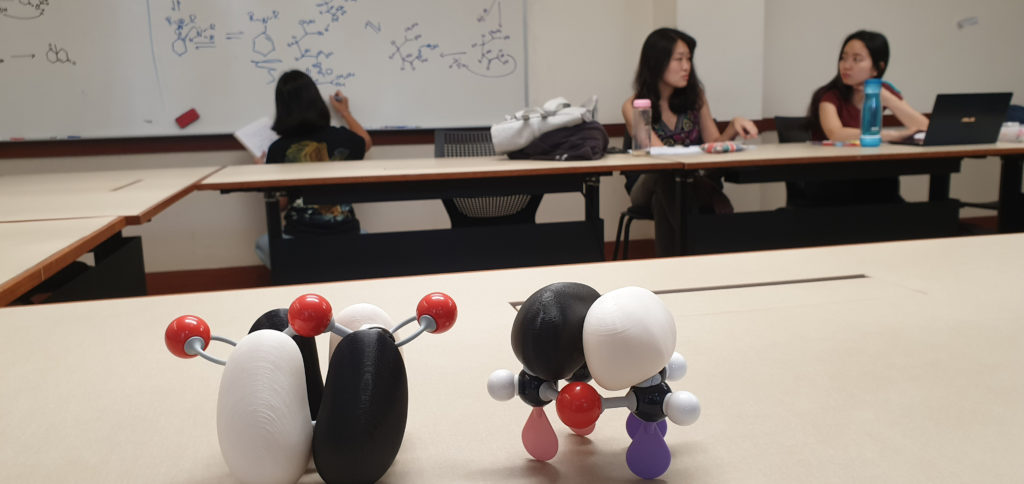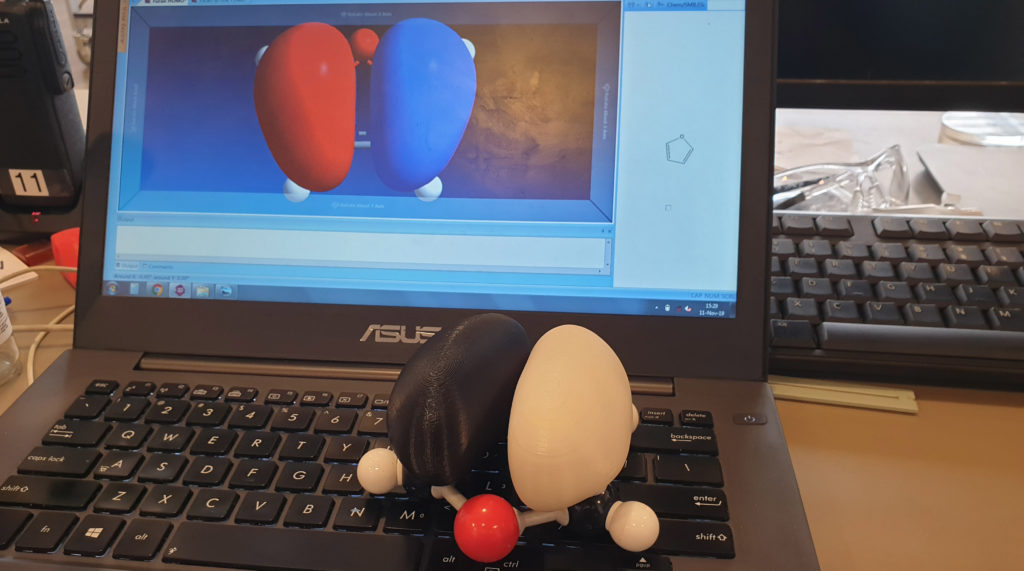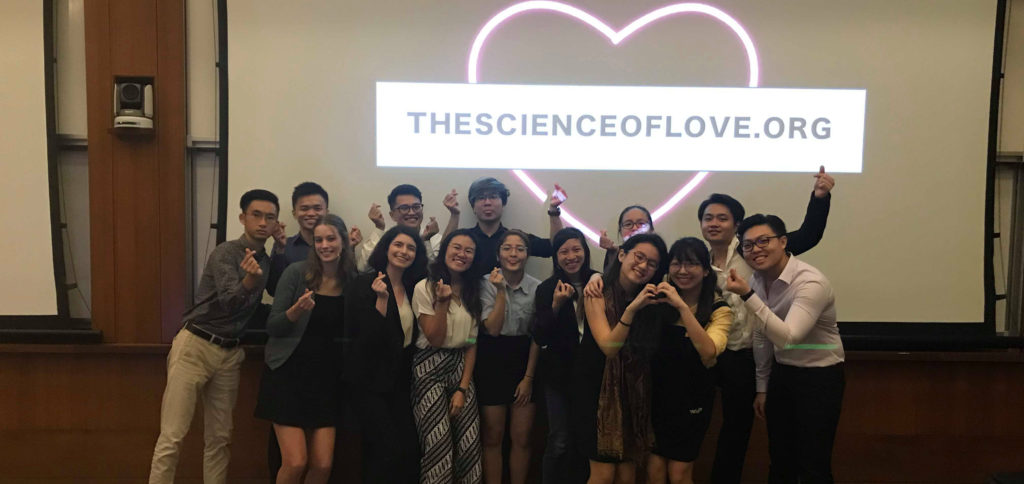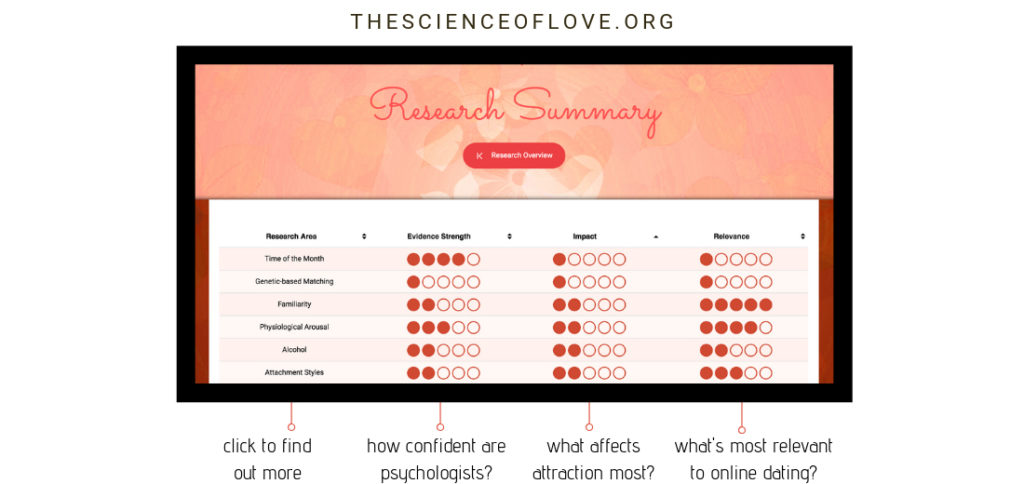Teaching Innovation Grant enhances teaching and learning at Yale-NUS
At Yale-NUS College, faculty members are constantly seeking ways to enhance their teaching and deliver the best learning experience to students. To support faculty, the Yale-NUS Teaching Innovation Grant (TIG) helps faculty develop new pedagogies, acquire instructional technologies for classes, and collaborate with other educators around the world.
Sponsored by Education Resources & Technology, Centre for Teaching & Learning and the President’s Office, the TIG supports faculty with up to $5,000 for their projects.
 3D-printed molecular models being used in Asst Prof Stanislav Presolski’s Accelerated Organic Chemistry class. Image provided by Asst Prof Stanislav Presolski.
3D-printed molecular models being used in Asst Prof Stanislav Presolski’s Accelerated Organic Chemistry class. Image provided by Asst Prof Stanislav Presolski.
In the last academic year, Assistant Professor of Science (Chemistry) Stanislav Presolski was awarded the TIG for his project, “Feeling the Invisible: Building 3D Models of Molecular Structures”.
Hoping to enable his students to understand molecular structures better, Asst Prof Presolski used the grant to purchase a 3D printer, which allowed him to create complex models for his course Accelerated Organic Chemistry. With the models, students can better understand the structure, properties and reactivity of carbon-based molecules.
Asst Prof Presolski explained that currently, chemists use molecular simulation software to model electron orbitals but such computer visualisations lack the materiality of physical objects and may be hard for students to grasp.
 Molecular orbitals displayed on the screen and the 3D-printed model. Image provided by Asst Prof Stanislav Presolski.
Molecular orbitals displayed on the screen and the 3D-printed model. Image provided by Asst Prof Stanislav Presolski.
“Many molecular orbitals tend to be quite similar to one another, so in the future we can not only use the models that have been printed, but also tap into the small library of shapes that we created and modify them slightly in order to illustrate the reactivity of completely different molecules,” said Asst Prof Presolski. He added that the 3D printer can be more readily used in the future to enhance chemistry teaching and learning at Yale-NUS.
Another TIG recipient was Assistant Professor of Social Sciences (Psychology) Jean Liu who used the grant to develop two websites for students to communicate their psychology research findings to policy makers, practitioners, and the public.
On her project, Asst Prof Jean Liu said, “At the heart of psychology is a mandate to “give psychology away”; to share publicly the vast insights on human behaviour that have been garnered through research. Despite this call, there have been few opportunities to publicise findings in an accessible manner, or to train psychology students to do so.”
 Asst Prof Jean Liu with her students in her Topics in Psychology: Love in an Age of Technology course. Image provided by Asst Prof Liu.
Asst Prof Jean Liu with her students in her Topics in Psychology: Love in an Age of Technology course. Image provided by Asst Prof Liu.
The first website, The Science of Love, has since been launched and features contributions from students in her Topics in Psychology: Love in an Age of Technology course. Her students reviewed articles discussing how romantic relationships are formed and developed a toolkit on how the literature can help dating applications and optimise user experience.
 A screenshot of Asst Prof Jean Liu’s website, www.thescienceoflove.org. Image provided by Asst Prof Liu.
A screenshot of Asst Prof Jean Liu’s website, www.thescienceoflove.org. Image provided by Asst Prof Liu.
Asst Prof Jean Liu is planning to develop the second website, which will showcase how psychology is applied to improve public policy outcomes. These student projects are done as part of psychology courses, final year capstone projects and extracurricular work.
The TIG also allowed Assistant Professor of Humanities (Writing, Literature) Heidi Stalla to attend a conference on “Performative Formats and Sonic Argumentation Symposium” at Lund University, Sweden, which helped enhance her teaching and created opportunities for collaboration with external faculty.
Passionate about helping students understand and engage with complex texts, Asst Prof Stalla began experimenting with pedagogy around the audio-essay to help students understand how to integrate evidence and evaluate sources in their academic work.
“The audio-essay is an emerging form in academia so I was excited to attend the symposium at Lund University and talk about teaching through different modes of expression as well as receive feedback from faculty across the disciplines. The work-in-progress presented at the symposium has since been published as the audio essay, “Let Me Recite What History Teaches”, in the journal, Speculative Nonfiction”.
After the symposium, Asst Prof Stalla has continued to use the audio-essay as a teaching tool in workshops at Yale-NUS to help students to think about the composition process holistically. Asst Prof Stalla also collaborated with Dr Jennifer Sheridan, a biologist, to lead an experiential learning project in Borneo where students put together audio compositions that incorporated their field recordings to develop complex ideas about nature, writing, and self.
This semester break, as interest in remote teaching grows due to the impact of the COVID-19 pandemic, the CTL has started a special round of TIG applications for faculty members. This will support faculty members who want to engage in programmes and activities related to remote teaching.





